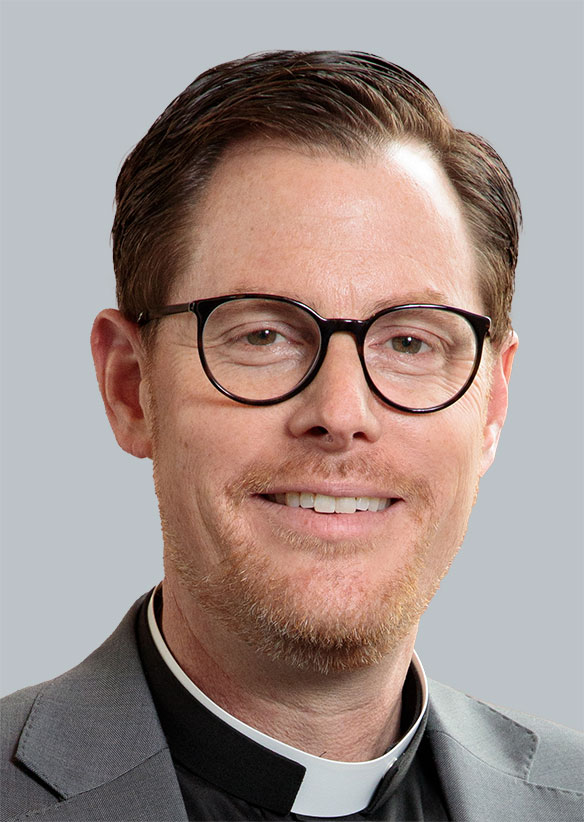The following is an abridged version of President Tom Egger’s commencement address Mekane Yesus Seminary, the main seminary for the Ethiopian Evangelical Church Mekane Yesus, in Addis Ababa, Ethiopia, on June 22, 2024.
Rev. Dr. Yonas Yigezu, President of the Ethiopian Evangelical Church Mekane Yesus, Rev. Teshome Amenu, General Secretary of the EECMY and Chairman of the Seminary Board, Rev. Dr. Bruk Ayele, President of Mekane Yesus Seminary, Other distinguished leaders and guests, Faculty of the seminary, Friends of the seminary, Families of the students, And honored graduates of this year’s class,
Peace to you in the Lord Jesus Christ. What an honor to be with you for this occasion. Thank you for the invitation and for your warm hospitality. I bring greetings to all of you from your friends in The Lutheran Church—Missouri Synod in the United States, and greetings from your brothers and sisters at Concordia Seminary in St. Louis, where I serve.
The theme chosen for this year’s commencement is “Rooted in Christ and His Word.” This theme is based on the words from St. Paul in Colossians Chapter 2: “As you therefore have received Christ Jesus the Lord, continue to live your lives in him, rooted and built up in him and established in the faith, just as you were taught, abounding in thanksgiving.”[i]
Rooted in Christ. Dear friends, we are God’s little plants.
Isn’t it amazing that you can take a tiny seed, put it in the soil, give it water and light, and up comes a plant! A flourishing, flowering plant is an amazing thing. A beautiful miracle! But what we see above the surface of the soil is, of course, just a part of the story. Each little seed, before it begins to grow upward, sends down the beginning of its roots. The root is what will sustain the life of the plant.
Jesus describes the spread of the Gospel as a farmer sowing seed. And, in Jesus’s parable, some of the seed was eaten by birds or choked out by weeds. And some of the seed fell on rocky places without much soil. “And when the sun rose,” Jesus says, “[those little plants] were scorched. And since they had no root, they withered away.” What a blessed thing it is, indeed, when the seed of the Word falls on soil in which it can grow roots, be deeply rooted, and grow, and bloom, and produce grain! And that is my prayer for you, for us—to be rooted in Christ and rooted in His Word.
To be rooted in Christ is to be rooted in His Word. This is our Lutheran heritage. We are a sola Scriptura church—Scripture alone. Our Lutheran Confessions spring from the Scriptures, and so they spring from Christ. A properly rooted church must grow up from Jesus Christ and from His scriptural Word.
Jesus says, “If you abide in my word, you are truly my disciples.”[ii] To be rooted in Christ is to be rooted in His Word.
Brothers and sisters, attend to the Holy Scriptures. Do not add to them, and do not take away from them. Do not depart from them to the left or to the right. Graduates, for your lives as Christians, for your service to the church, this is a crucial commitment. Mekane Yesus Seminary, for your profitable teaching and for the edification of your church this is the crucial commitment: that the Word of God be the unshakeable foundation of your work. The Holy Scriptures, the inspired, unbreakable, prophetic, and apostolic witness of the Old and New Testaments, this source of heavenly wisdom which reveals to us Jesus Christ and the Gospel of life. This Word will not deceive us. From this Word flow sap and nutrients into our core, into our trunk, into our branches, into our leaves, flowers, and fruit. This precious written Word that gives us Christ and life. Oh, let us remain rooted in Christ and in His Word.
With humility and with brotherly love, let me join to this word of encouragement some words of warning. On the one hand, it is unthinkable that we would depart from God’s Word or that our children would reject God’s Word. On the other hand, we must be humble and sober-minded, acknowledging that the story of God’s people throughout history has been a story of turning away from His Word, being slow to hear, slow to believe. “To the Torah and to the Testimony,” the prophet Isaiah had to exhort the people, because they had neglected the Scriptures in their life as a people, and spiritual darkness had descended upon them.[iii]
Proud disregard for the Word of God is a modern problem but not only a modern problem. Proud disregard for the Word of God is a Western problem but not only a Western problem. It is a perennial human problem. Skepticism toward the Word of God goes all the way back in history to the Garden of Eden. “Did God really say?” That’s what the devil taught our first parents to ask, and sinful human beings have been asking it ever since. Throughout the history of God’s people—in Old Testament times, in New Testament times—throughout the history of God’s people, their turning away from the Lord has always been their turning away from His Word, from the Word of His inspired prophets and apostles.
In the most recent centuries of the Christian Church, nothing has been so deadly, nothing has done more to cut off the Church from her Root, from her Lord, than the arrogant, humanist idea that somehow God’s divine revelation in His Word should be open to our critique, to our reinterpretation, and even to our outright dismissal. Voices outside the church, and, more tragically and more dangerously, voices inside the church, point at the Bible and ask, “Did God really say?”
Within the world of theological education in the twenty-first century, there are some, even some who bear the name Christian, who would claim that they themselves, with their great intelligence, religious consciousness, and moral sensibility, that they themselves must function as an even brighter light than the Scriptures. They want to tell us where the Scriptures are right and where they are wrong. In the end, they want to tell us what is true, and the Holy Scriptures must sit in the back seat.
But that is not the teaching of Jesus, or of the Bible itself, or of Luther, or of our Lutheran Confessions. What Lutherans confess about our Triune God and about ourselves we confess from the Scriptures. To all that the Bible teaches us, to everything of which it bears witness, we say “Yes. Amen. It is so.”
“Lord, to whom shall we go? You have the words of eternal life.”[iv]
Dear friends, do not be deceived, to prefer human wisdom to the Word of God is to turn the plant upside down. To place human wisdom and human religious ideas ahead of what the divinely inspired prophets and apostles have written and handed down to us, this is to pull a beautiful flower up from the earth, roots and all, and then to plant it again with the flower under the soil and the roots upward, baking in the sun. This is a better flower! some might exclaim. This is a flower that will be attractive to people in the world today, some may plead. But it is a poor flower, and it will soon be dead. This is one of the great reasons for the decline of the church in the Western world. Do not imagine that this cannot become a temptation for you in Ethiopia.
The plant must depend upon the root. We must drink from and listen to all that the Lord has to say in His Word. How foolish it would be for us to try to instruct God. Dr. Luther himself acknowledged: “For neither [church] councils, [church] fathers, nor we [ourselves] . . . will do as well as the holy scripture—that is, God himself—has done . . . As such, we must let the prophets and apostles sit on the lectern, and we here below at their feet must hear what they say, and not say what they must hear.”[v]
Dear graduates, one day, before the throne of God, we will give an account of our stewardship of God’s Word. Let us be found faithful. As pastors and teachers, you bear a great responsibility. As leaders of the church, you bear a great responsibility. As the largest Lutheran church in the world, you bear a great responsibility. Stand firmly, clearly, unapologetically, uncompromisingly, then, upon the Word of Christ, the words of Holy Scripture.
“As you therefore have received Christ Jesus the Lord, continue to live your lives in him, rooted and built up in him and established in the faith, just as you were taught.”
From the precious Root of Christ’s Word, you will gain the knowledge of the fullness of Christ’s love.[vi] This, above all, is why we treasure the truthfulness and the certainty of the Holy Scriptures. For they testify of Jesus Christ. They testify that there is now no condemnation for those who are in Christ Jesus. They testify that no one who takes refuge in Him will ever be put to shame. They testify that He will never leave us or forsake us. They testify that He will raise us up on the last day. They testify that “neither death nor life, nor angels nor rulers, nor things present nor things to come, nor powers, nor height nor depth, nor anything else in all creation, will be able to separate us from the love of God in Christ Jesus our Lord.”[vii] And this knowledge of God’s love for us in Jesus fills our hearts with thanksgiving and praise that will never end.
Little plants. We are Jesus’s little plants. Let us remain rooted in Him. Let us endeavor to drink with joy and gratitude from the nourishment of Christ and His Word. My prayer for you, at Mekane Yesus Seminary, is that one hundred years from now (if Christ has not yet come), this will be a place where your descendants will say:
Though all the world was turning away from the Word of Christ, our forefathers devoted themselves to this bright Word. They studied it deeply. They loved and trusted God’s Word. To what they read there, they humbly said, ‘Amen,’ and they did not substitute it with the notions of men or with the fashions of the day. They proclaimed the truth of God’s Word to all. They found the Savior Jesus there. And they preserved this Word, and confidence in this Word, for us.
Brothers and sisters, may your descendants say this. May those who follow you here still say this in one hundred years. God grant this, for Jesus’s sake.
“The grass withers, the flower fades, but the word of our God will stand forever.[viii]
[i] Colossians 2:6–7 NRSV. The theme and Bible passage (in NRSV translation) were chosen by Mekane Yesus Seminary as the theme for their 2024 Commencement.
[ii] John 8:31 ESV.
[iii] Isaiah 8:20 in the broader context of Isaiah 8:16–9:2.
[iv] John 6:68.
[v] Cf. AE 34:284. Cited in and translated by John A. Maxfield, Luther’s Lectures on Genesis and the Formation of Evangelical Identity (Kirksville, Mo: Truman State University Press, 2008), 12.
[vi] See especially Colossians 2:1–9 and Ephesians 3:16–19.
[vii] Romans 8:38–39 ESV.
[viii] Isaiah 40:8 ESV.



Leave a Reply
You must be logged in to post a comment.